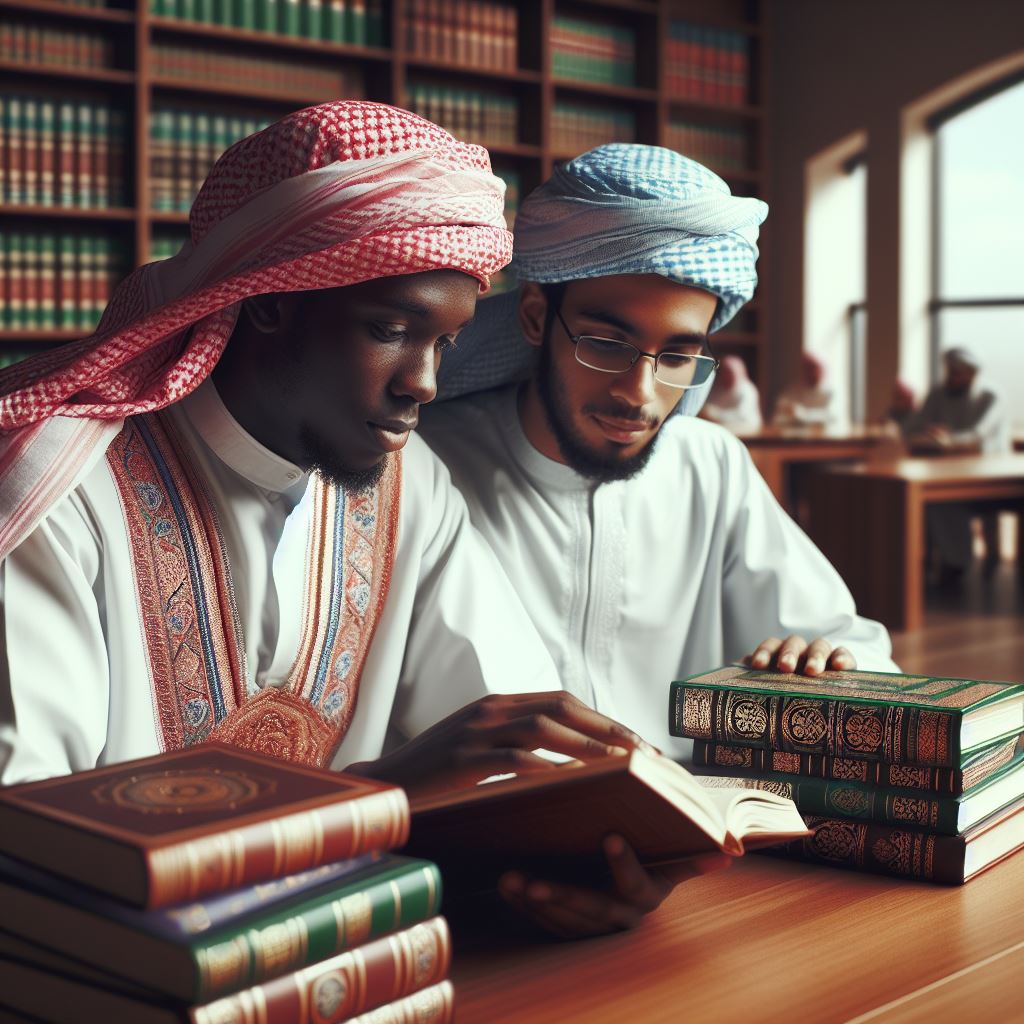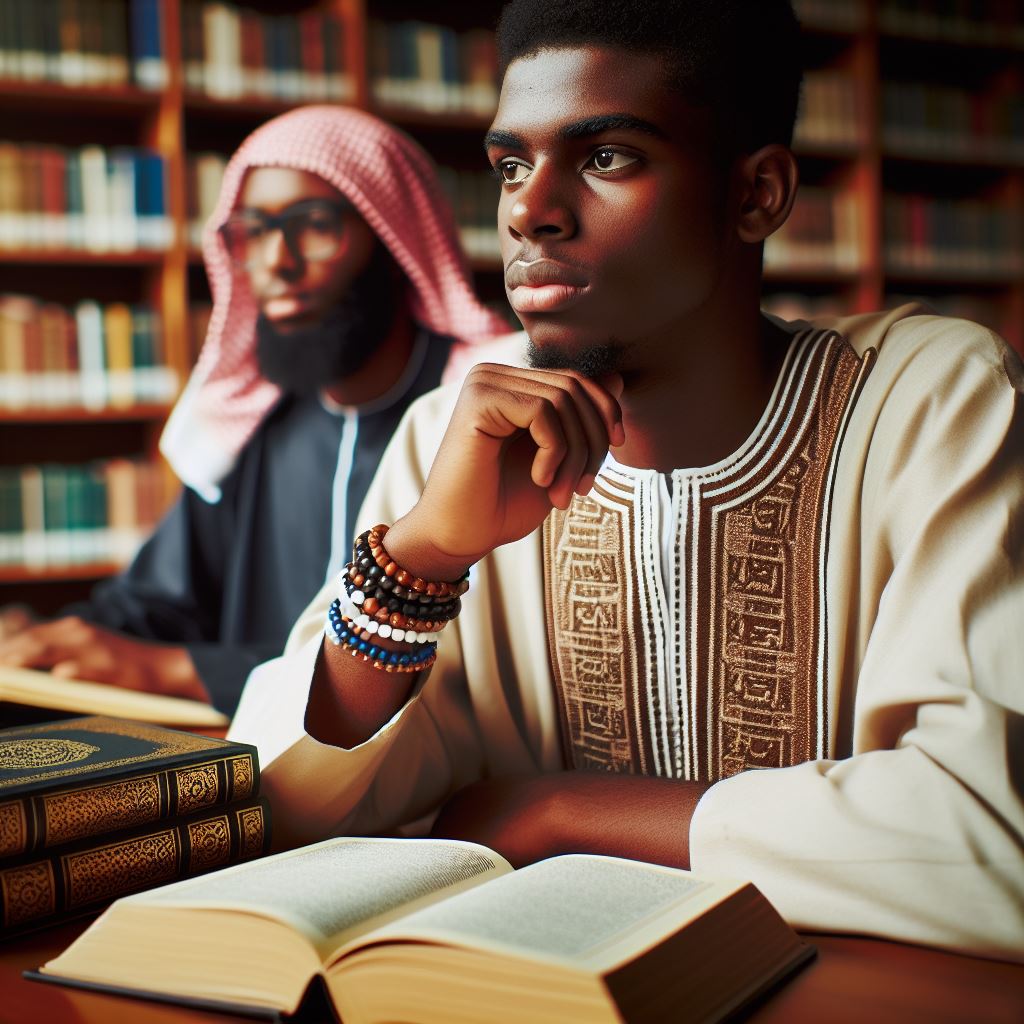Introduction
Arabic and Islamic Studies involve the learning of the Arabic language and the teachings of Islam. These disciplines hold significant importance in Nigeria due to the country’s large Muslim population.
The history of Arabic and Islamic education in Nigeria dates back centuries, with Arabic being introduced through trade routes and Islamic scholars.
Arabic serves as the language of the Quran, thus making it essential for Muslims to learn. Islamic Studies, on the other hand, provides a deeper understanding of the religion, its principles, and practices.
In Nigeria, where Islam has a strong presence, the study of Arabic and Islamic teachings plays a crucial role in religious and educational settings.
The early introduction of Islam in Northern Nigeria led to the establishment of Quranic schools for religious instruction. Initially, these schools focused on memorization, recitation, and understanding of the Quran.
Over time, Arabic and Islamic studies expanded to include a broader curriculum covering Hadith, Fiqh, Islamic history, and jurisprudence.
The incorporation of Arabic and Islamic Studies into the Nigerian educational system has been a response to the growing interest in Islamic knowledge and a desire to preserve the country’s cultural heritage.
Today, Arabic and Islamic education continues to thrive in Nigeria, with institutions offering specialized programs at various levels, from primary schools to universities.
Evolution of Arabic and Islamic Studies in Nigeria
Origins of Arabic Education in Nigeria
Arabic education traces back to pre-colonial times. It was primarily introduced by Islamic scholars and traders.
The early schools were known as “Makaranta” where Arabic was taught. These schools were run by local scholars and often held in mosques.
Arabic education played a crucial role in preserving Islamic culture.
Introduction of Islamic Education in Nigeria
Islamic education in Nigeria dates back to the 11th century. Islamic scholars introduced Islamic teachings alongside Arabic.
The famous centers of Islamic learning include Timbuktu and Gao. Islamic education emphasized spiritual and moral development.
It contributed to the spread of Islam in various Nigerian regions.
Development of Arabic and Islamic Studies Over the Years
The colonial era led to a decline in Arabic and Islamic studies. Western education system marginalized traditional Arabic schools.
Arabic and Islamic studies faced challenges in the modern educational system. Efforts have been made to integrate Arabic and Islamic studies into mainstream education.
Islamic universities and institutions are now offering courses in Arabic and Islamic studies.
Basically, Arabic and Islamic studies have a rich history in Nigeria. Despite facing challenges, the importance of these studies remains significant.
Efforts to preserve and promote Arabic and Islamic education are ongoing. The evolution of Arabic and Islamic studies reflects the cultural and religious diversity of Nigeria.
It is crucial to continue supporting and investing in Arabic and Islamic education for the future.
Read: Scholarships for Communication Arts Students in Nigeria
Curriculum of Arabic and Islamic Studies in Nigeria
Overview of Topics Covered
Arabic and Islamic studies in Nigeria encompass a broad range of topics. Key areas include:
- Arabic Language: Students learn reading, writing, grammar, and literature.
- Qur’anic Studies: Focus on memorization, interpretation (Tafsir), and understanding of the Quran.
- Hadith Studies: Study of the sayings and actions of Prophet Muhammad.
- Fiqh (Islamic Jurisprudence): Examination of Islamic legal rulings and practices.
- Aqidah (Islamic Theology): Exploration of core beliefs in Islam.
- Seerah (Prophetic Biography): Detailed study of the life of Prophet Muhammad.
- Islamic History: Understanding the historical development of Islamic civilization.
Teaching Methods and Techniques
The teaching methods in Arabic and Islamic studies vary widely. Key approaches include:
- Lectures: Instructors deliver detailed explanations on complex topics.
- Group Discussions: Students engage in discussions to deepen understanding.
- Memorization: Students memorize Quranic verses and Hadiths.
- Interactive Learning: Use of multimedia resources to enhance engagement.
- Peer Teaching: Students teach each other to reinforce learning.
- Practical Demonstrations: Application of Fiqh rules in real-life scenarios.
Fostering Moral Values and Ethics
Arabic and Islamic studies play a crucial role in moral and ethical development. Key contributions include:
- Character Building: Students learn virtues like honesty, integrity, and compassion.
- Community Engagement: Emphasis on social justice and community service.
- Respect for Diversity: Teaching tolerance and understanding of different cultures and beliefs.
- Personal Discipline: Encouraging regular prayer, fasting, and self-control.
- Ethical Decision-Making: Guiding students to make decisions based on Islamic principles.
- Leadership Skills: Preparing students for roles as moral leaders in their communities.
The curriculum of Arabic and Islamic studies in Nigeria is comprehensive and multifaceted. It not only imparts religious knowledge but also promotes moral and ethical values.
The teaching methods are diverse, ensuring that students engage actively with the material. Ultimately, these studies aim to develop individuals who are knowledgeable in Islam and capable of contributing positively to society.
Read: Career Paths in Communication and Language Arts
Institutions offering Arabic and Islamic Studies in Nigeria
Universities
- Ahmadu Bello University, Zaria
- Bayero University, Kano
- University of Lagos
- University of Nigeria, Nsukka
- University of Ilorin
These universities offer Bachelor’s, Master’s, and Ph.D. programs in Arabic and Islamic Studies.
Colleges
- Federal College of Education, Kano
- Federal College of Education, Zaria
- College of Arabic and Islamic Legal Studies, Ilorin
These colleges provide diploma and certificate courses in Arabic and Islamic Studies.
Schools
- Arabic and Islamic schools (Makaranta) in various states
- Islamic education centers in urban and rural areas
These schools cater to children and adults seeking basic and advanced Islamic knowledge.
Quality of education provided in these institutions
The institutions offering Arabic and Islamic Studies in Nigeria have maintained high standards of education in these disciplines. Their faculty members are scholars and experts in Arabic, Islamic theology, jurisprudence, and history.
These institutions provide students with a comprehensive understanding of Arabic language, Islamic principles, and the history of Islamic civilization.
Students are exposed to a wide range of courses, including Quranic studies, Hadith (Prophetic traditions), Islamic jurisprudence, and Islamic history.
Students are also encouraged to engage in research and critical thinking, which fosters a deeper understanding of Islamic texts and promotes intellectual growth.
The institutions emphasize the importance of practical application of Islamic teachings in contemporary society.
Contributions of these institutions to the promotion of Arabic and Islamic knowledge in Nigeria
The institutions offering Arabic and Islamic scholarship in Nigeria play a crucial role in preserving and promoting Arabic and Islamic knowledge in the country. They serve as centers of learning, research, and dissemination of Islamic teachings.
These institutions produce qualified professionals, scholars, and educators who contribute to the development of Islamic education in Nigeria.
Graduates from these institutions go on to become teachers, preachers, researchers, and leaders in Islamic communities across the country.
Furthermore, these institutions organize seminars, conferences, and workshops that promote dialogue, understanding, and cooperation among Muslims and non-Muslims.
They also publish scholarly works and academic journals that contribute to the global discourse on Arabic and Islamic scholarship.
Overall, the institutions offering Arabic and Islamic scholarship in Nigeria are instrumental in preserving the cultural heritage, promoting religious tolerance, and advancing knowledge in these fields.
Their contributions have a lasting impact on the intellectual and spiritual development of individuals and communities in Nigeria and beyond.
Read: Global Impact of African and Asian Studies Research

Challenges facing Arabic and Islamic Studies in Nigeria
- Inadequate funding: One of the major challenges facing Arabic and Islamic scholarship in Nigeria is the lack of adequate funding from both the government and private institutions.
- Lack of qualified teachers: Another challenge hindering the progress of Arabic and Islamic education in Nigeria is the shortage of well-trained and qualified teachers in this field.
- Lack of modern teaching resources: The absence of modern teaching resources such as textbooks, audiovisual aids, and technology in Arabic and Islamic scholarship classrooms limits the quality of education.
Impact of these challenges on the quality of education in Arabic and Islamic studies
- Low educational standards: The lack of funding and qualified teachers leads to low educational standards in Arabic and Islamic scholarship programs across Nigeria, affecting the overall quality of education.
- Inadequate learning outcomes: The scarcity of modern teaching resources hampers the effectiveness of teaching and learning in Arabic and Islamic scholarship, resulting in poor learning outcomes.
- Decreased interest in the subjects: As a consequence of these challenges, students may lose interest in pursuing Arabic and Islamic scholarship due to the substandard quality of education provided.
Strategies to address these challenges
- Increased funding: The government and relevant stakeholders should allocate more resources towards improving Arabic and Islamic studies education in Nigeria to enhance its quality
- Teacher training programs: Establishing training programs and workshops for teachers to enhance their skills and knowledge in Arabic and Islamic scholarship will help address the lack of qualified educators.
- Integration of modern teaching methods: Introducing modern teaching resources and methods in Arabic and Islamic scholarship classrooms will enhance the quality of education and improve learning outcomes.
By addressing these challenges and implementing effective strategies, the quality of education in Arabic and Islamic scholarshipin Nigeria can be significantly improved, leading to better academic outcomes and increased interest in these important subjects.
Read: Language Learning in African and Asian Studies
Find Out More: Top Nigerian Universities Offering Music Programs
Find Out More: Fieldwork in Nigerian Anthropology: What to Expect
The Future of Arabic and Islamic Studies in Nigeria
Opportunities for Growth and Development
Arabic and Islamic studies in Nigeria hold immense potential for growth. The country’s rich cultural heritage offers a strong foundation. Many Nigerians are increasingly interested in these disciplines, seeking to connect with their roots.
- Educational Institutions: Universities and schools can expand their Arabic and Islamic scholarship programs.
- Online Courses: Digital platforms can offer accessible learning options.
- Research Opportunities: Scholars can explore untapped areas of Arabic and Islamic history and philosophy.
- Community Centers: Local centers can provide informal education and cultural immersion.
By harnessing these opportunities, Nigeria can elevate the status of Arabic and Islamic scholarship, making them more prominent and respected.
Improving the Quality of Education
To enhance the quality of Arabic and Islamic education, several measures are essential. First, curriculum development must be a priority. A well-structured curriculum can provide a comprehensive understanding of both classical and modern aspects of these fields.
- Teacher Training: Investing in the professional development of educators is crucial.
- Modern Resources: Utilizing updated textbooks and digital tools can enhance learning experiences.
- Collaborations: Partnering with international institutions can bring global perspectives and standards.
- Assessment Methods: Implementing effective evaluation techniques ensures that students grasp the material thoroughly.
These steps can significantly improve educational outcomes and produce well-rounded scholars in Arabic and Islamic studies.
Promoting Arabic and Islamic Studies Among Youth
Engaging young people in Arabic and Islamic studies requires innovative strategies. Youth are the future, and their interest in these disciplines is vital for their sustained growth.
- Cultural Festivals: Organizing events can spark interest and celebrate heritage.
- Interactive Learning: Utilizing multimedia tools can make learning more engaging.
- Youth Organizations: Establishing clubs and societies can provide a sense of community and belonging.
- Mentorship Programs: Connecting students with mentors in the field can inspire and guide them.
By making Arabic and Islamic studies appealing and relevant, we can ensure that younger generations embrace these disciplines.
The future of Arabic and Islamic studies in Nigeria is bright with numerous opportunities for growth.
By focusing on improving the quality of education and actively promoting these fields among the youth, Nigeria can create a thriving environment for Arabic and Islamic studies.
This not only preserves cultural heritage but also fosters a deeper understanding of important religious and historical contexts. The steps outlined above can serve as a roadmap for achieving these goals, ensuring that Arabic and Islamic studies continue to flourish in Nigeria.
Find Out More: Impact of Globalization on Nigerian Languages
Conclusion
In summary, Arabic and Islamic studies in Nigeria have vast growth potential. Expanding educational programs and online courses can enhance accessibility.
Improved teacher training, modern resources, and collaborations can raise education quality. Promoting these studies among youth through cultural festivals and interactive learning is crucial.
Key Points
- Growth Opportunities: Educational institutions and digital platforms can expand Arabic and Islamic scholarship.
- Quality Improvement: Curriculum development and modern resources enhance learning.
- Youth Engagement: Cultural events and interactive tools can attract young learners.
Arabic and Islamic scholarship play a vital role in preserving Nigeria’s rich cultural heritage. They also provide deeper insights into religious and historical contexts.
Supporting the development and promotion of these disciplines is essential for their continued success. Let us commit to fostering a vibrant future for Arabic and Islamic scholarship in Nigeria.




